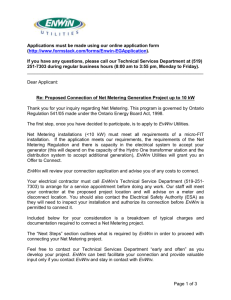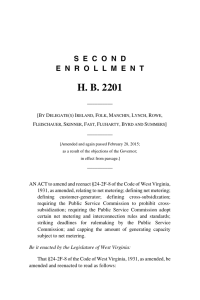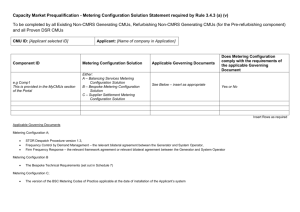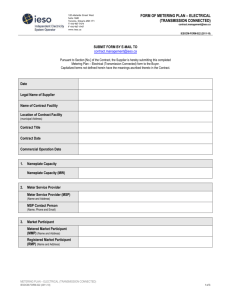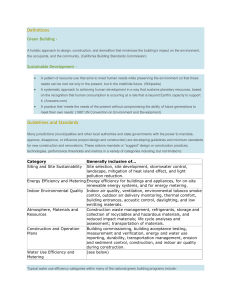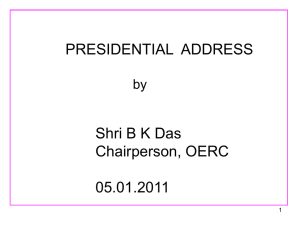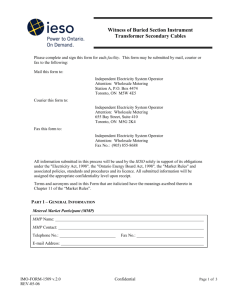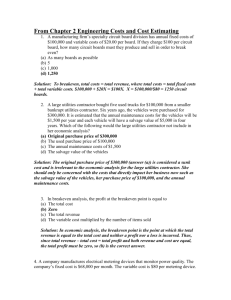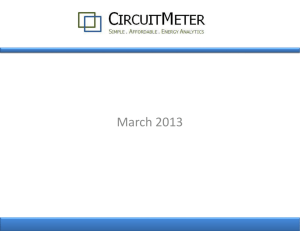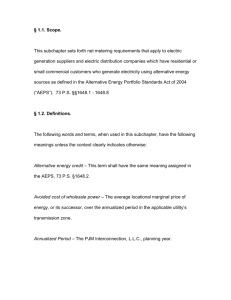NJ-Net Metering Standards - National Energy Marketers Association
advertisement
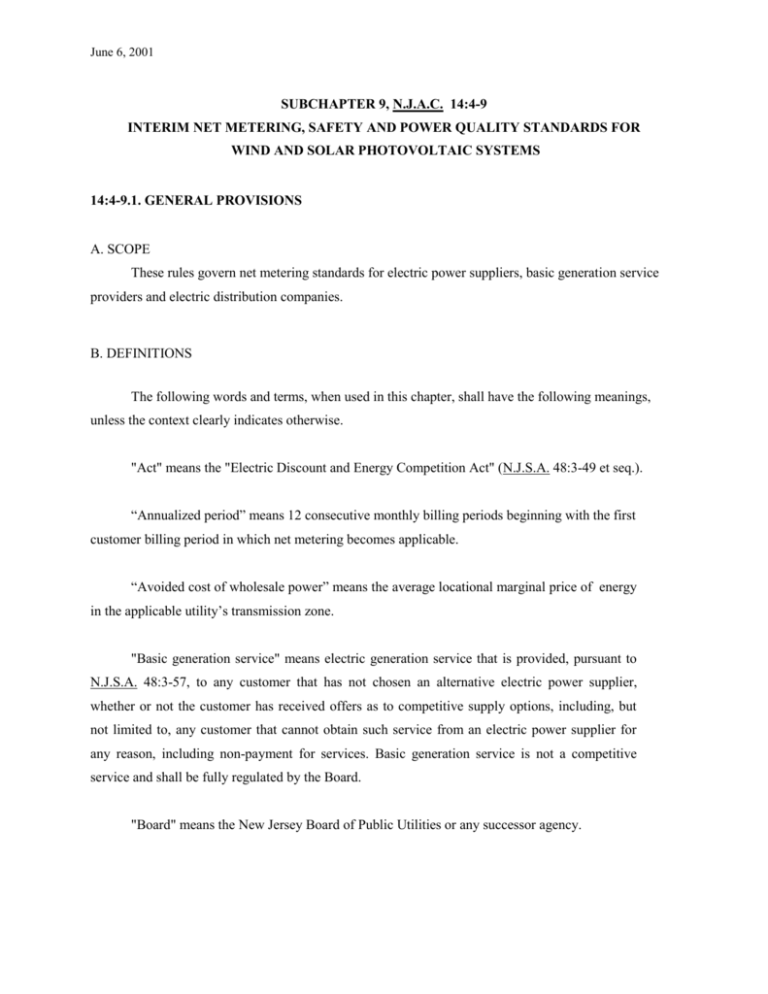
June 6, 2001 SUBCHAPTER 9, N.J.A.C. 14:4-9 INTERIM NET METERING, SAFETY AND POWER QUALITY STANDARDS FOR WIND AND SOLAR PHOTOVOLTAIC SYSTEMS 14:4-9.1. GENERAL PROVISIONS A. SCOPE These rules govern net metering standards for electric power suppliers, basic generation service providers and electric distribution companies. B. DEFINITIONS The following words and terms, when used in this chapter, shall have the following meanings, unless the context clearly indicates otherwise. "Act" means the "Electric Discount and Energy Competition Act" (N.J.S.A. 48:3-49 et seq.). “Annualized period” means 12 consecutive monthly billing periods beginning with the first customer billing period in which net metering becomes applicable. “Avoided cost of wholesale power” means the average locational marginal price of energy in the applicable utility’s transmission zone. "Basic generation service" means electric generation service that is provided, pursuant to N.J.S.A. 48:3-57, to any customer that has not chosen an alternative electric power supplier, whether or not the customer has received offers as to competitive supply options, including, but not limited to, any customer that cannot obtain such service from an electric power supplier for any reason, including non-payment for services. Basic generation service is not a competitive service and shall be fully regulated by the Board. "Board" means the New Jersey Board of Public Utilities or any successor agency. "Customer-generator" means a residential or small commercial customer that generates electricity, on the customer's side of the meter, using wind or solar photovoltaic system. “Electric distribution company “ means an electric public utility, as the term is defined in N.J.S.A. 48:2-13, that transmits or distributes electricity to end users within this State. "Electric generation service" means the provision of retail electric energy and capacity which is generated off site from the location at which the consumption of such electric energy and capacity is metered for retail billing purposes, including agreements and arrangements thereto. "Electric power supplier" means a person or entity that is duly licensed pursuant to the provisions of the Act to offer and to assume the contractual and legal responsibility to provide electric generation service to retail customers, including load serving entities, marketers and brokers that offer or provide electric generation service to retail customers. The term excludes an electric public utility that provides electric generation service only as basic generation service pursuant to N.J.S.A. 48:3-57. "IEEE" means the "Institute of Electrical and Electronic Engineers." "Net metering" means that the customer-generator is billed according to the difference between the amount of electricity supplied by the electric power supplier or basic generation service provider in a given billing period and the electricity delivered from the customers’ side of the meter using wind or solar photovoltaic systems, with customer generation in excess of electricity supplied credited over an annualized period. “Network distribution system” means an electric delivery system characterized by multiple uni-directional sub-transmission or primary-voltage feeders that are transformed and converge to a secondary service voltage level, where secondary conductors are commonly interconnected via automated secondary switches. The vast majority of network distribution systems consist entirely of underground construction and are primarily in urban areas. “Non-discriminatory rates” means rates that are identical, with respect to rate structure, retail rate components, and any monthly charges, to the rates the customer-generator would have been charged if not a customer-generator. 2 Docket No. EX99030182 14:4-9.2. NET METERING STANDARDS A. REQUIREMENTS (1) All electric power suppliers and basic generation service providers shall offer net metering at non-discriminatory rates to their residential and small commercial customers that generate electricity, on the customer's side of the meter, using a wind or solar photovoltaic system. (2) A standard contract or tariff providing for net metering shall be developed and made available by each electric power supplier and basic generation service provider to eligible customer-generators on a first-come, first-served basis. (3) Electric distribution companies shall be permitted to install a second meter, at their expense and with the customer’s permission, to measure gross Kwh delivered from customer-generators. If such a meter is installed, it shall be an electronic meter capable of hourly readings to collect data useful for future tariff design and use of distributed generation. If such a meter is installed, the utility shall supply its readings to the customer on a billing period basis, and at times of peak usage. These provisions notwithstanding, a single meter shall be sufficient for any residential or small commercial customer to take advantage of net metering under these standards. (4) When the amount of electricity delivered by the customer-generator plus any kilowatt hour credits held over from previous billing periods exceed the electricity supplied by the electric power supplier or basic generation service provider, the electric power supplier or basic generation service provider, as the case may be, shall credit the customer-generator for the excess kilowatt hours until the end of the annualized period at which point the customer-generator will be compensated for any remaining credits at the electric supplier's or basic generation service provider’s avoided cost of wholesale power. (i) When a customer-generator switches electric suppliers, the electric power supplier or basic generation service provider with whom service is terminating shall treat the end of the service period as if it were the end of the annualized period. 3 Docket No. EX99030182 (5) Net metering will be reviewed by the Board and may cease to be offered, upon Board authorization, whenever the total rated generating capacity owned and operated by net metering customer-generators statewide equals 0.1 percent of the State's peak electricity demand or the annual aggregate financial impact to electric power suppliers and basic generation service providers statewide, as determined by the Board, exceeds $2,000,000, whichever occurs first. (i) The Board will conduct a public hearing and provide opportunity for public comment prior to ceasing any net metering offering(s). (6) Each basic generation service provider and electric power supplier shall submit an annual report to the Board indicating the rated generating capacity owned and operated by its net metering customer-generators, the net Kwh received from customer-generators and the aggregate value of net metering credits provided during the previous twelve months. Annual reports shall be due October 31st of each year for the period ending September 30th of each year. (i) For purposes of this section, “aggregate value of net metering credits” means the total amount of energy delivered by customer-generators. (7) Customer-generators will be eligible for net metering up to a maximum allowable capacity per customer-generator of 100 Kw, but not to exceed the current peak electric needs of its own residential or small commercial facility. 14:4-9.3. SAFETY AND POWER QUALITY STANDARDS A. REQUIREMENTS (1)Interconnection costs shall be paid by the customer-generator and shall be in addition to any line extension charge required to meet service requirements. (2) Customer-generators shall not be charged a fee greater than $100 to process applications for net metering and the net metering interconnection. (3) Customer-generators shall bear the cost of meeting all applicable safety and power quality standards approved by the National Electrical Code, Institute of Electrical and Electronics Engineers, and accredited testing institutions, such as Underwriters Laboratories. 4 Docket No. EX99030182 (4) Customer-generator facilities rated up to and including 10 Kw, except for those facilities served by network distribution systems, shall comply with all applicable safety and power quality standards approved by the National Electrical Code, Institute of Electrical and Electronics Engineers, and accredited testing institutions, such as Underwriters Laboratories, and specifically IEEE Standard 929-2000. (5) Customer-generator facilities rated above 10 Kw and not more than 100 Kw, and those rated 10 Kw and less and served by network distribution systems, shall comply with all applicable safety and power quality standards approved by the National Electrical Code, Institute of Electrical and Electronics Engineers, accredited testing laboratories, such as Underwriters Laboratories, and electric distribution company tariffs, as approved by the Board. (6) An electric distribution company may not require an eligible customer-generator whose system(s) meets the standards above to install additional controls, perform or pay for additional tests or purchase additional liability insurance. 5 Docket No. EX99030182
